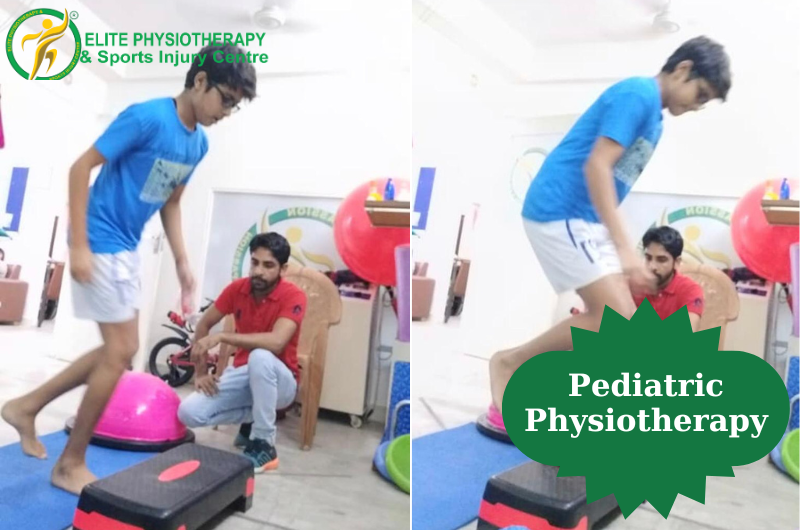
Pediatric Physiotherapist
Pediatric physiotherapy is a dedicated branch of physiotherapy focusing on the unique needs of infants, children, and adolescents. It aims to support young patients in overcoming developmental, neuromuscular, and orthopedic challenges, facilitating optimal growth and functional independence. Through personalized treatment plans, which may include exercises, play-based therapy, and education, pediatric physiotherapists help improve mobility, strength, coordination, and balance. This specialized care is crucial for addressing congenital conditions, injuries, or diseases affecting children’s physical abilities. By fostering a supportive and engaging environment, pediatric physiotherapists empower young individuals to reach their full physical potential, enhancing their quality of life.
Questions
WHAT IS PEDIATRIC PHYSIOTHERAPY?
The management of prenatal problems, conditions identified in early infancy, childhood injuries, and the transfer to adult care can all be effectively handled by pediatric physiotherapy. Physiotherapy for children enhances their quality of life and physical function.1, 2 Its long-term advantages include a lower impact on future health care service utilization by lowering impairment and the necessity for surgery or other more expensive intrusive therapies.
Pediatric physiotherapy services include care in acute care hospitals, the community, and educational institutions for a broad range of acute and chronic diseases. With an emphasis on enhancing function and fostering independence, pediatric physiotherapists examine, diagnose, and treat neurological, developmental, cardiorespiratory, and orthopedic disorders in children up to the age of 18. For children patients suffering from chronic illnesses including cerebral palsy, cystic fibrosis, and juvenile idiopathic arthritis, physical endurance, muscular strength, and motor control all improve significantly with physiotherapy.
HOW DOES IT WORK?
Children who get pediatric physiotherapy can grow physically to their full potential. They handle patients ranging in age from one day old newborns to teenagers and possess specialized understanding in the mobility, development, and conditions that are likely to harm the baby and growing youngster. Soft tissue massage, mobilization, stretching, targeted therapy exercises, and posture teaching are among possible treatment modalities. These therapists support children in moving to the best of their ability via play and developmentally appropriate pleasure and instruction since they are not little grownups. The kid and his family will always be the center of the physiotherapist's work, and they will have the chance to work with the child in a variety of settings, including the home, preschool classes, the classroom, and recreational activities.
The physiotherapist may collaborate with several other professions, such as medical professionals, nurses, social workers, educators, caretakers, psychiatric and psychological teams, speech and occupational therapists, and others, according to the child's and family's complicated demands. In order to effectively collaborate with other members of the team and with the child, the physiotherapist working in these teams must be able to explain observations, evaluations, and treatment plans. In addition to his physiotherapy abilities, a pediatric physiotherapist has to have a thorough awareness of children development, primitive reflex patterns, pediatric sickness, and disability in order to work successfully and efficiently.
WHAT COMMON CONDITIONS ARE TREATED IN PEDIATRIC PHYSIOTHERAPY?
For children ages 0 to 18 who struggle with their physical development due to neurological and/or developmental issues, a pediatric physiotherapist can offer specialized physiotherapy treatment. Brain, spinal cord, or peripheral nerve issues can give rise to neurological diseases. Children and/or babies with neurological disorders may experience challenges with their range of motion, muscular strength, mobility, and balance.
Pediatric physiotherapists are very skilled in treating a wide range of neurological disorders in children, such as:
• Gross motor delay
• Autism Spectrum Disorder
• Cerebral Palsy
• Developmental Coordination Disorder
• Down Syndrome
• Spina Bifida
• Acquired Brain Injury
• Hypotonia
• Muscular Dystrophy or other neuromuscular challenges
• Torticollis/Plagiocephaly
• Other genetic disorders
• Weight challenges
• AthleteYour child's growth, mobility, strength, and balance will all be evaluated at the outset to create a structured therapy plan that may include the following:
• Stretching
• Strengthening
• Re-educating normal movement patterns
• Balance training
• Improving standing and quality of walking
• Advice and support for parents and or teachers
• Milestone development
• Working on fine and gross motor skillsWHO CAN BENEFIT FROM PEDIATRIC PHYSIOTHERAPY?
Pediatric physiotherapists are highly skilled in the evaluation, recognition, diagnosis, and management of developmental and mobility issues in children. With a generous helping of imagination, fun, and humor, pediatric physiotherapists use their highly developed practical abilities to create customized treatment plans for each of their patients. The goal of the treatment plans is to maximize each child's health, abilities, and well-being so they can move and engage in daily activities like playing, learning, attending school, and being a member of their family and community.Children that struggle with development may find it challenging to meet their developmental milestones by the anticipated age or period. The majority of children learn or establish developmental milestones, which typically manifest in specific age groups. For instance, rolling, crawling, walking, talking, and head control. For kids with neurological or developmental issues, physiotherapy treatment can help them realize their full potential and advance their physical development to meet milestones like rolling, crawling, and walking.
While there is a wide range of mobility abnormalities and issues that pediatric physiotherapists may assist with, some of them include:
• infants and kids who take longer to reach their motor development milestones, such as infants who take longer to learn how to sit, crawl, or walk
• infants and kids who move in strange ways, such as: W-sitting, toe walking, or bottom meandering
• Children who struggle with motor abilities, such as hopping or leaping, or with using a ball
• Babies and toddlers that lack coordination or clumsiness
• Children who have experienced trauma or injury and need therapy to return to their best
• Youngsters who obsess about things

